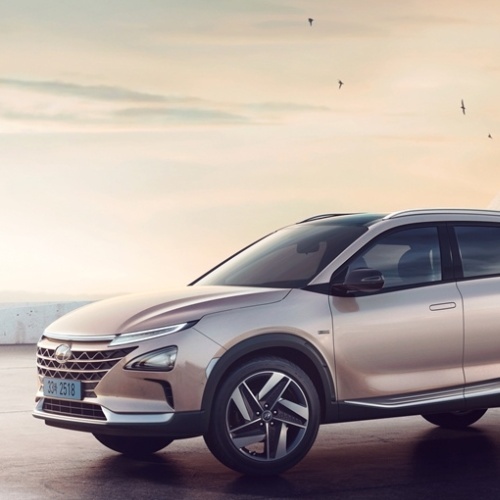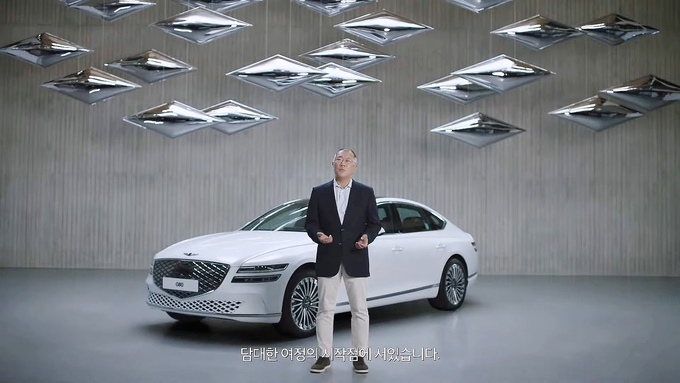Hyundai’s Nexo takes up half of global FCEV sales
Automaker struggles with next-generation model due to cost, lack of infrastructure
By Kim Da-solPublished : Dec. 30, 2021 - 16:30

Global sales of the eco-friendly hydrogen fuel cell electric vehicles almost doubled compared to last year, while more than half of them came from Hyundai Motor’s sole fuel cell EV model, Nexo, market data showed Thursday.
From January to November, a total of 16,200 fuel cell EVs have been registered, about a 95.1 percent increase compared to a year ago, according to SNE Research data. The firm expected the figure to surpass 18,000 for this year.
Hyundai Motor has topped the list having sold 8,900 Nexos globally, thanks to buoyed consumer interest and the launch of the 2021 version of its only fuel cell EV. The figure is about a 46 percent increase compared to the same period last year.
Following the Korean carmaker were Toyota with sales of 5,700 units of its fuel cell model and Honda at 300.
“From the second quarter this year, Hyundai Motor has increased its market presence, widening the gap between Japanese rivals,” SNE research said in a report.
Despite Hyundai’s lead, the carmaker faces challenges in releasing a next-generation model. The launching of upgraded models is pivotal for an auto company to cement its market dominance.
Local outlets reported earlier this week that Hyundai’s luxury brand, Genesis, has temporarily suspended its development of the Genesis fuel cell model.
Hyundai Motor said a technical flaw was discovered during an inspection in the development of a third-generation fuel cell battery. Following the discovery, the company has restructured its research unit and rescheduled its R&D time frame last month.
The company said the “(halt in development of a Genesis fuel cell model) does not mean that the development for a new car will be suspended.” It did not elaborate further.
In September, Hyundai Motor Group Chairman Chung Euisun spoke about the Genesis brand’s vision to launch only EVs and hydrogen fuel cell cars from 2025. By 2030, the brand will have completed eight model lineups that comprise a mix of battery-powered and fuel cell-powered models, according to Chung.

Fuel cell batteries, which work as the engine in the combustion model, is a core part of fuel cell EVs.
The third-generation fuel cell battery that was being developed was unveiled in September, with the carmaker touting a 30 percent reduction in volume and two to three times higher capacity and durability compared to the previous version.
But cost became an issue as the carmaker sought to secure cost competitiveness. The company said that by 2025, it would decrease the price of fuel cell batteries -- currently at around 30 million won ($25,000) -- by 50 percent.
Market insiders said Chung is also aware of such issues, which must be solved prior to continuing the development of a new fuel cell model.
Market viewers also point to the lack of infrastructure as a hurdle for the carmaker to cement its market lead in the commercialization of fuel cell EVs.
By 2022, the country plans to build 310 charging stations for fuel cell EVs, up from the current 117.
The price of fuel cell comes in at 8,430 won per kilogram, but the government wants to pull it down to the 6,000-won level next year.
Experts said that the lack of infrastructure is closely related to the technology, regardless of Hyundai Motor’s technical capacity to develop a fuel cell car.
“Even Toyota, which has the market-leading fuel cell EV development techniques, estimate the fuel cell car market to own just 3 percent of the global automotive market in 2030. This means that Korea needs to be more realistic, and come up with feasible goals,” said Lee Hang-koo, a researcher at Korea Automotive Technology Institute.
According to a government-led hydrogen economy road map announced in 2019, the country has set a target to reach an accumulated 81,000 units of fuel cell EVs by 2022. But the figure has only hovered at 21,000 as of end of November.
“The government’s plan to influx large quantity of eco-friendly vehicles is too focused on what an ideal environment looks, based on its excessive target in terms of carbon dioxide reduction,” said Bae Choong-sik, head of the Korean Society of Automotive Engineers. “Authorities should seek balance between combustion-powered cars, electric cars and fuel cell cars considering all factors in the environment, economy and sustainability, rather than be too immersed in subsidy plans for eco-friendly cars.”










![[Hello India] Hyundai Motor vows to boost 'clean mobility' in India](http://res.heraldm.com/phpwas/restmb_idxmake.php?idx=644&simg=/content/image/2024/04/25/20240425050672_0.jpg&u=)








